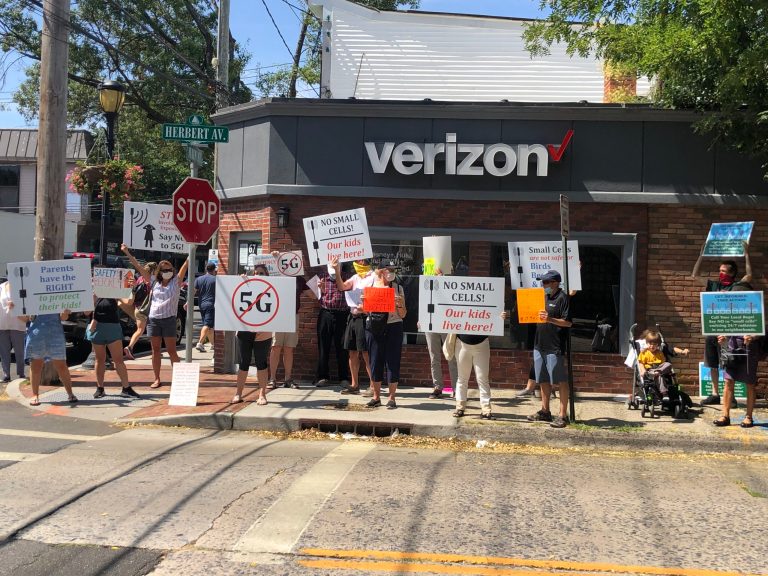
Port Washington residents gathered in front of a Verizon Wireless store on Port Boulevard at noon on Wednesday to protest 16 cell nodes that a court order has approved to be built across the Port peninsula.
The demonstrators chose the store as the site of their protest because Verizon had contracted with wireless infrastructure provider ExteNet Systems to build cell nodes in various areas across the North Shore.
With a victory in ExteNet’s lawsuit against the Town of North Hempstead, which initially received applications for the cell nodes and was found to have failed to act or schedule a public hearing on them, the construction is almost certainly inevitable.
In August 2019, ExteNet filed applications to install 16 cell nodes in areas including Port Washington Estates, Manhasset Bay Estates, Bayview Colony and the Plandome Manor border with the Town of North Hempstead. After months of inaction where a “shot clock” was reset and ran out, ExteNet sued the town and won on the ground that the town had failed to act on the applications within a “reasonable” time frame, with no public hearings on the applications planned from last August to February.
The company was then granted summary judgment in a June 26 court order which calls for the town to “issue all approvals necessary for ExteNet’s installation of the 16 small wireless facilities” and “cooperate in good faith to coordinate with ExteNet during construction and installation.” North Hempstead has filed an appeal and sought a stay of the judgment but no such stay has been awarded.
Mike Gallagher, an organizer of the protest, lives in Bayview Colony in Port, and said that one of the nodes has been mapped out 23 feet from his property.
“We want to let everybody know that Verizon is coming into this town, and they’re putting 16 cell nodes to start with,” Gallagher said in an interview. “There’s been absolutely no communication to the people, it’s just 16 people that are directly impacted.”
Gallagher said that the residents originally thought that North Hempstead would take action against the nodes before going to trial.
“When they got the application back in August, they should have rejected them,” he said. “Instead they did nothing. They didn’t have any hearings, they didn’t have a town hall. They didn’t send out an email communication, they didn’t send out letters to the town. So what the judge in the case said was, ‘You want to appeal this ‘shot clock’ that ran out, but guess what – you’ve taken absolutely no action.'”
He added that the only communication that residents had received was an email from former Councilwoman Dina De Giorgio, who in December warned her constituents that the applications had been sent. One month beforehand, De Giorgio had been defeated for re-election by current Councilwoman Mariann Dalimonte, who was set to take office less than a month after the email was sent.
Further, Gallagher said the town’s lack of action and lack of working with ExteNet caused the problem.
“By not acting, [the Town of North Hempstead] can blame it on the lawyers, they could blame it on the [Federal Communications Commission],” Gallagher said. “That’s where I have a problem too. The fact is, they’re playing, they’re playing politics, and they’re saying you know as long as they’re not moving the nodes somewhere, then they can’t be at fault.”
The Verizon store that the group chose as the protest site is called Port Wireless, and is a licensed retailer of Verizon products and plans. Gallagher said the intention was not to be against the owners of the small business.
“I’ll go in, I’ll talk to the small-business owner and say look, this isn’t against you,” Gallagher said. “Bottom line, you’re a franchisee, so you assume reputation risk from Verizon at this point. I can’t help that.”
As Gallagher and other residents collected signatures and passed out pages of information to passers-by, protesters held aloft signs reading “Small cells are not safe for birds, bees and babies,” “No health experiments in Port” and “Safety before convenience,” voicing their concerns about health effects as a result of radiation from the nodes.
Such effects are a concern for Port resident Lorraine Miller, who said a node is mapped out next to her home in Manhasset Bay Estates.
“We don’t want this, it’s so damaging,” Miller said. “There are thousands of studies showing the harmful effects of this radiation. This technology is really in its infancy, and we really don’t know what the effects will be.”
Under FCC rules, municipalities can only cite aesthetics and node locations as valid reasons to reject applications, with other factors like health reasons not allowed for consideration. The rules have not stopped residents on the North Shore from bringing up their concerns over health as a result of the nodes at public meetings and forums for villages that received applications.
ExteNet has also sued the villages of Lake Success, Flower Hill, Plandome and Plandome Manor in the past two years after each village, after widespread public backlash, did not approve its requests to build cell nodes. Legal proceedings are ongoing in all four villages.
The town had not previously discussed the application in public session, but Supervisor Judi Bosworth did speak disapprovingly of “the companies who want to install upgraded 5G cell phone transmission equipment in residential areas” in her State of the Town address in January.
Gallagher said that the town’s “failure” is what caused the protest.
“So, the town failed us. The lawyers failed us. Now we’re appealing to Verizon,” he said.






